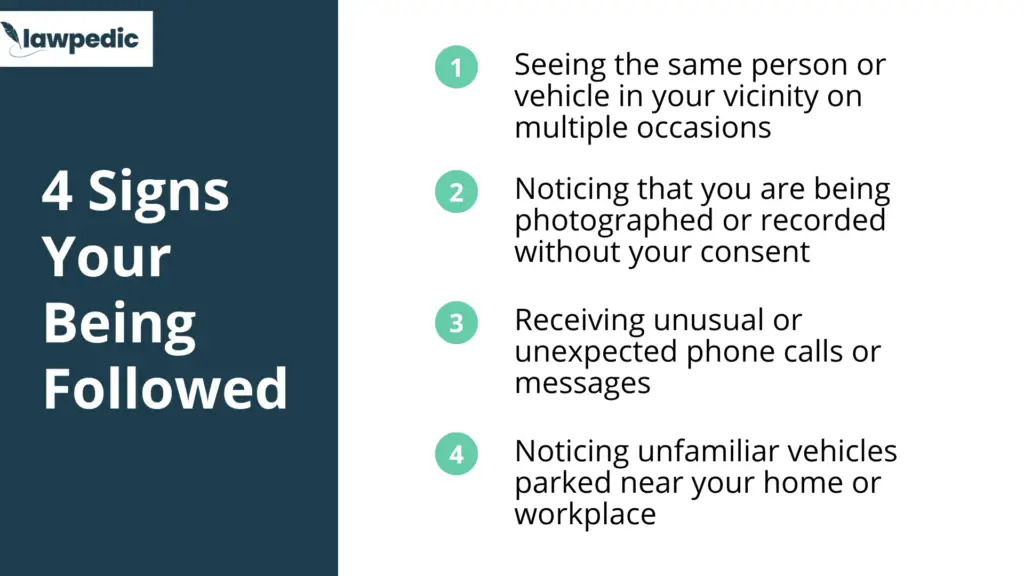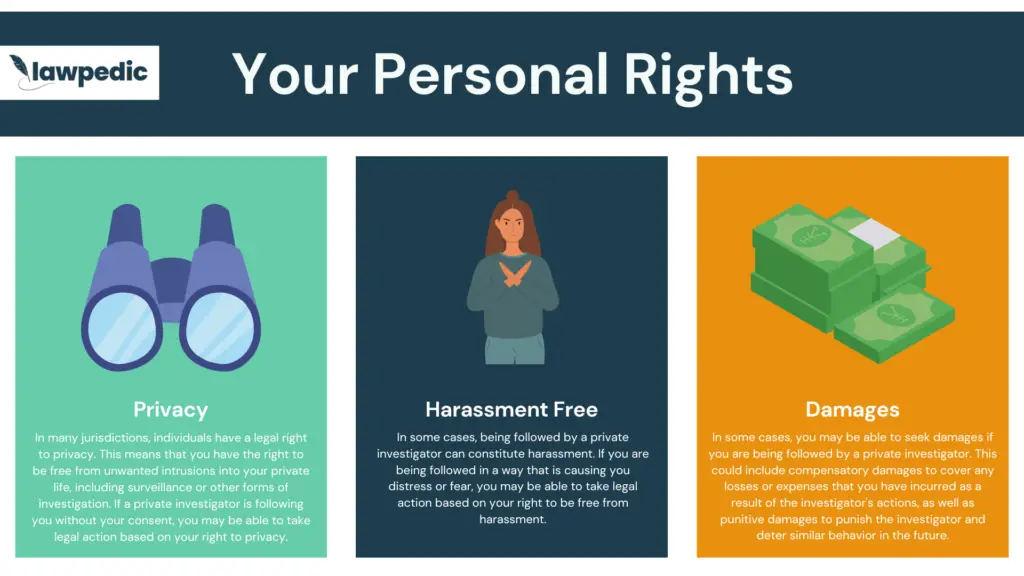Quick Summary:
You cannot sue for the sheer fact that you’re being followed by a private investigator. Most of the time private investigators are collection public information. The only time you’d be able to sue is if the PI was breaking any laws while they were conducting their investigation. An example of this could be if they were trespassing on private property, or if they were using illegal methods to obtain information.
Continue reading to learn more about whether you can sue someone for hiring a private investigator, as well as some examples of when a PI may cross legal boundaries during an investigation.
What does a private investigator do?
An expert who is hired to carry out investigations on behalf of clients is known as a private investigator. Private investigators are frequently hired to obtain information or evidence for a variety of purposes, and they typically have a background in law enforcement or a similar field. Background checks, looking for missing people, doing surveillance, and obtaining information for use in court cases are some typical jobs that private investigators might handle. To provide security services or to look into crimes like fraud or theft, private investigators may also be engaged.
There are many different ways and reasons to hire a private investigator. If a person has a specific need for investigation services, they might occasionally employ a private investigator directly. A person who is worried about their spouse’s loyalty, for instance, might hire a private investigator to carry out monitoring and acquire proof. In other instances, private investigators may be employed by lawyers to help with court matters, such as by carrying out investigations or gathering data for presentation in court. Businesses or organizations may also employ private investigators to provide security services or to look into possible crimes or misconduct within the firm. The particular duties and activities of the private investigator will change in each of these situations based on the demands and objectives of the client.
Signs you’re being followed

Here are some potential signs that you may be being followed by a private investigator:
- Seeing the same person or vehicle in your vicinity on multiple occasions
- Noticing that you are being photographed or recorded without your consent
- Receiving unusual or unexpected phone calls or messages
- Feeling like you are being watched or followed
- Noticing unfamiliar vehicles parked near your home or workplace
- Receiving mail or packages from unknown sources.
Steps to take if you’re being followed by a private investigator
If you think you are being followed by a private investigator, it is important to take steps to protect your privacy and safety. Some potential steps you may want to consider include:
- Notifying the authorities: If you believe that you are being followed by a private investigator, you should notify law enforcement. They will be able to assess the situation and determine the appropriate course of action.
- Changing your routine: If you are being followed, you may want to alter your daily routine to throw the private investigator off your trail. This could involve changing your route to work or school, varying the times that you leave your home or office, and taking other steps to make it more difficult for the private investigator to track your movements.
- Seeking legal advice: If you are being followed by a private investigator, you may have legal remedies available to you. An attorney can advise you on your rights and the steps you can take to protect yourself.
- Protecting your privacy: It is important to take steps to protect your privacy if you are being followed by a private investigator. This could involve changing your phone number, using a post office box for your mail, and taking other steps to limit the information that is available about you.
Overall, if you think you are being followed by a private investigator, it is important to remain calm and to seek advice from law enforcement and legal professionals. They will be able to help you assess the situation and determine the best course of action.
Your rights when being investigated

If you are being followed by a private investigator, you may have certain legal rights that can protect you. The specific legal rights that are available to you will depend on the circumstances of your case, as well as the laws of your state or country. However, some potential legal rights that you may have include:
- The right to privacy: In many jurisdictions, individuals have a legal right to privacy. This means that you have the right to be free from unwanted intrusions into your private life, including surveillance or other forms of investigation. If a private investigator is following you without your consent, you may be able to take legal action based on your right to privacy.
- The right to be free from harassment: In some cases, being followed by a private investigator can constitute harassment. If you are being followed in a way that is causing you distress or fear, you may be able to take legal action based on your right to be free from harassment.
- The right to seek damages: In some cases, you may be able to seek damages if you are being followed by a private investigator. This could include compensatory damages to cover any losses or expenses that you have incurred as a result of the investigator’s actions, as well as punitive damages to punish the investigator and deter similar behavior in the future.
What can you sue for?
If you decide to take legal action against someone who has hired a private investigator to follow you, the potential outcomes of such a lawsuit will depend on the specific circumstances of your case. In general, there are several possible remedies that a court may award in a case involving a private investigator, including:
- Injunctive relief: In some cases, a court may issue an injunction ordering the private investigator to stop following you. This could include an order to stay away from your home, workplace, or other specific locations.
- Compensatory damages: If you have incurred any losses or expenses as a result of being followed by a private investigator, you may be able to seek compensatory damages. This could include damages to cover any medical bills, lost wages, or other expenses that you have incurred as a result of the investigator’s actions.
- Punitive damages: In some cases, a court may award punitive damages to punish the private investigator and to deter similar behavior in the future. Punitive damages are intended to go beyond simply compensating the victim for their losses, and are designed to send a message that the behavior in question will not be tolerated.
- Attorneys’ fees: In some cases, a court may award attorneys’ fees to the plaintiff. This means that the defendant will be required to pay for the legal costs that the plaintiff incurred in bringing the lawsuit.
Overall, the potential outcomes of a lawsuit against a private investigator will depend on the specific facts of your case. An attorney can advise you on the potential remedies that may be available to you and help you pursue the appropriate legal action.
When to seek legal advice
If you are being followed or investigated by a private investigator, it is important to seek legal advice as soon as possible. This can help ensure that your rights are protected and can give you the information and support that you need to take appropriate action. Some factors to consider when deciding whether to consult with an attorney include:
- The level of surveillance or investigation that you are experiencing, including whether it is occurring on a regular basis or has caused any physical or emotional harm
- The legal rights and protections that may be available to you in your jurisdiction, such as the right to privacy, the right to be free from harassment, and/or the right to seek damages
- Whether you can identify the person or entity that hired the private investigator, and whether you can provide any evidence to support your claim
- Whether you can afford to hire an attorney or would be eligible for free legal representation
- Any deadlines or other time constraints that may apply in your case
Ultimately, consulting with an attorney can help ensure that you make informed decisions about how to respond to being followed or investigated by a private investigator.
